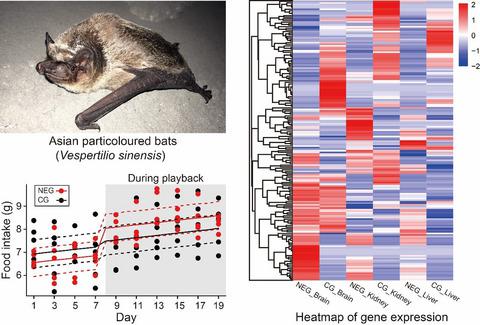当前位置:
X-MOL 学术
›
J. Appl. Ecol.
›
论文详情
Our official English website, www.x-mol.net, welcomes your feedback! (Note: you will need to create a separate account there.)
Chronic traffic noise increases food intake and alters gene expression associated with metabolism and disease in bats
Journal of Applied Ecology ( IF 5.7 ) Pub Date : 2020-06-27 , DOI: 10.1111/1365-2664.13710 Shengjing Song 1, 2 , Yang Chang 1 , Daiping Wang 3 , Tinglei Jiang 1 , Jiang Feng 1, 2, 4 , Aiqing Lin 1
中文翻译:

慢性交通噪音会增加食物摄入量,并改变与蝙蝠代谢和疾病相关的基因表达
更新日期:2020-06-27
Journal of Applied Ecology ( IF 5.7 ) Pub Date : 2020-06-27 , DOI: 10.1111/1365-2664.13710 Shengjing Song 1, 2 , Yang Chang 1 , Daiping Wang 3 , Tinglei Jiang 1 , Jiang Feng 1, 2, 4 , Aiqing Lin 1
Affiliation

|
- Anthropogenic noise exposure has deleterious effects on the foraging ecology of many animals. However, the effects of chronic anthropogenic noise on food intake and health condition in wildlife remain largely unknown.
- We tested whether traffic noise exposure over multiple days would change food intake and would have effects on the health of Asian particoloured bats. We broadcast traffic noise to the bats of two noise‐exposure groups (group A, five bats; group C, six bats) and broadcast silence files to the bats of two control groups (group B, five bats; group D, six bats) for 12 days. We measured the changes in food intake, body weight and concentration of faecal triiodothyronine (T3) and thyroxine (T4) in groups A and B. We compared the transcriptional profiles in brain, kidney and liver tissues between bats in groups C and D.
- The bats exposed to traffic noise had a significantly higher daily food intake and a significantly greater body weight than bats in control group during the period of playback. Faecal T3 and T4 were higher in the noise‐exposure group after playback had been on for more than 1 day.
- We found a total of 169 differentially expressed genes (DEGs) between noise‐exposure and control groups. Some DEGs related to stress response were upregulated in the bats exposed to noise. The 169 DEGs were mainly enriched in Gene Ontology (GO) terms associated with metabolism, fundamental cellular processes, stress response and immune response. The Kyoto Encyclopedia of Genes and Genomes (KEGG) pathways affected by noise exposure were linked with metabolism, disease, apoptosis, autophagy, phagosome and ribosome.
- Synthesis and applications. Our results suggest that bats exposed to chronic traffic noise while roosting may need more energetic intake and have a greater motivation to forage than others not exposed to noise, probably as a result of a stress response. Furthermore, chronic traffic noise may increase the risk of metabolic dysregulation, immune disorders and other diseases. Management measures for reducing noise disturbance, for example, implementing sound barriers, are essential.
中文翻译:

慢性交通噪音会增加食物摄入量,并改变与蝙蝠代谢和疾病相关的基因表达
- 人为噪声的暴露对许多动物的觅食生态具有有害影响。然而,慢性人为噪声对野生生物食物摄入和健康状况的影响仍然未知。
- 我们测试了连续数天的交通噪声暴露是否会改变食物摄入量,并且是否会影响亚洲色蝙蝠的健康。我们向两个噪声暴露组(A组,五个蝙蝠; C组,六个蝙蝠)的蝙蝠广播交通噪声,并向两个对照组(B组,五个蝙蝠; D组,六个蝙蝠)的蝙蝠广播静音文件。持续12天。我们测量了A组和B组食物摄入量,体重和粪便三碘甲状腺素(T3)和甲状腺素(T4)浓度的变化。我们比较了C组和D组蝙蝠在脑,肾和肝组织中的转录谱。
- 在播放期间,暴露于交通噪音中的蝙蝠的每日食物摄入量显着高于对照组的蝙蝠,体重也显着更大。回放持续超过1天后,噪声暴露组的粪便T3和T4较高。
- 我们发现噪声暴露和对照组之间共有169个差异表达基因(DEG)。与应激反应有关的一些DEGs在暴露于噪音的蝙蝠中被上调。169个DEG主要富含与代谢,基本细胞过程,应激反应和免疫反应相关的基因本体论(GO)术语。受噪声影响的《京都基因与基因组百科全书》(KEGG)途径与新陈代谢,疾病,细胞凋亡,自噬,吞噬体和核糖体有关。
- 综合与应用。我们的研究结果表明,与其他未暴露于噪音的蝙蝠相比,在栖息地时暴露于慢性交通噪声的蝙蝠可能需要更多的能量摄入,并且觅食的动机更大,这可能是由于应激反应所致。此外,慢性交通噪音可能会增加代谢失调,免疫失调和其他疾病的风险。减少噪声干扰的管理措施(例如,设置声屏障)至关重要。


























 京公网安备 11010802027423号
京公网安备 11010802027423号